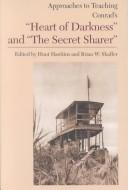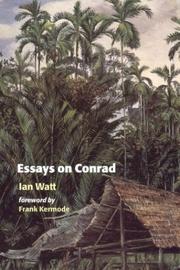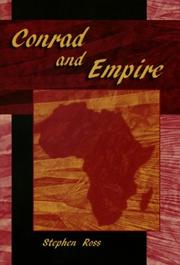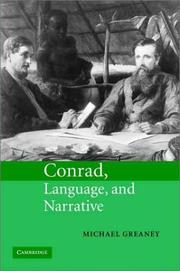Book
ISBN: 9516488099 Year: 1982 Publisher: Åbo Åbo akademi
Abstract | Keywords | Export | Availability | Bookmark
 Loading...
Loading...Choose an application
- Reference Manager
- EndNote
- RefWorks (Direct export to RefWorks)
Narration (Rhetoric) --- Time in literature --- History --- Conrad, Joseph, --- Korzeniowski, Józef Konrad Teodor, --- Korzeniowski, Joseph Conrad Theodore, --- Konrad, Dzhozef, --- Kʻang-la-te, --- Conrad-Korzeniowski, Joseph, --- Korzeniowski, Joseph Conrad-, --- Kʻonradŭ, Josep, --- Kʻonradŭ, Chosep, --- Kʻolladŭ, Josep, --- Konrad, Dzd. --- Conrad, Józef, --- קונראד, ג׳וזף, --- קונראד, ג׳וסף --- קונרד, ג׳וזף --- קונרד, ג׳וזף, --- קונרד, יוסף --- 康拉德, --- Konrad Nalecz Korzeniowsky, Jozef Tedor, --- Konrant, Tzozeph, --- Philosophy. --- Technique. --- Rhetoric --- Discourse analysis, Narrative --- Narratees (Rhetoric) --- Conrad (jozef teodor konrad nalecz korzeniowski, dit joseph), 1857-1924 --- Critique et interpretation

ISBN: 9780873529020 0873529022 0873529030 Year: 2002 Publisher: New York Modern language association of America
Abstract | Keywords | Export | Availability | Bookmark
 Loading...
Loading...Choose an application
- Reference Manager
- EndNote
- RefWorks (Direct export to RefWorks)
Psychological fiction, English --- History and criticism. --- Study and teaching. --- English psychological fiction --- English fiction --- History and criticism --- Study and teaching --- Conrad, Joseph, --- Korzeniowski, Józef Konrad Teodor, --- Korzeniowski, Joseph Conrad Theodore, --- Konrad, Dzhozef, --- Kʻang-la-te, --- Conrad-Korzeniowski, Joseph, --- Korzeniowski, Joseph Conrad-, --- Kʻonradŭ, Josep, --- Kʻonradŭ, Chosep, --- Kʻolladŭ, Josep, --- Konrad, Dzd. --- Conrad, Józef, --- קונראד, ג׳וזף, --- קונראד, ג׳וסף --- קונרד, ג׳וזף --- קונרד, ג׳וזף, --- קונרד, יוסף --- 康拉德, --- Konrad Nalecz Korzeniowsky, Jozef Tedor, --- Konrant, Tzozeph, --- Africa --- In literature.

ISBN: 0521783879 0521780071 1107119944 0511013744 0511118546 0511155905 0511325339 0511485344 1280159065 0511049994 9780511013744 9780511118548 9780521783873 9780521780070 9780511485343 9780511049996 9780511155901 9781107119949 9781280159060 9780511325335 Year: 2000 Publisher: Cambridge : Cambridge University Press,
Abstract | Keywords | Export | Availability | Bookmark
 Loading...
Loading...Choose an application
- Reference Manager
- EndNote
- RefWorks (Direct export to RefWorks)
Ian Watt (1917-99) has long been acknowledged as one of the finest of post-War literary critics. The Rise of the Novel (1957) is still the landmark account of the way in which realist fiction developed in the eighteenth century and Watt's work on Conrad has been enormously influential. Conrad in the Nineteenth Century (1979) was to have been followed by a volume addressing Conrad's later work, but the material for this long-awaited second volume remains in essay form. It is these essays, as Frank Kermode points out in his foreword, which form the nucleus of Essays on Conrad. Watt's own worldview, as well as his insight into Conrad's work, was shaped by his experiences as a prisoner of war on the River Kwai. His personal, and painfully moving, account of these experiences forms part of his famous essay 'The Bridge over the River Kwai as Myth' which completes this essential collection.
Conrad, Joseph --- Conrad, Joseph, --- Korzeniowski, Józef Konrad Teodor, --- Korzeniowski, Joseph Conrad Theodore, --- Konrad, Dzhozef, --- Kʻang-la-te, --- Conrad-Korzeniowski, Joseph, --- Korzeniowski, Joseph Conrad-, --- Kʻonradŭ, Josep, --- Kʻonradŭ, Chosep, --- Kʻolladŭ, Josep, --- Konrad, Dzd. --- Conrad, Józef, --- קונראד, ג׳וזף, --- קונראד, ג׳וסף --- קונרד, ג׳וזף --- קונרד, ג׳וזף, --- קונרד, יוסף --- 康拉德, --- Konrad Nalecz Korzeniowsky, Jozef Tedor, --- Konrant, Tzozeph, --- Criticism and interpretation. --- Arts and Humanities --- Literature --- Conrad (joseph), 1857-1924
Book
ISBN: 0691621306 0691012962 1400870313 0691060657 1322885184 9781400870318 9780691621302 0691647968 9780691012964 Year: 2015 Publisher: Princeton, NJ : Princeton University Press,
Abstract | Keywords | Export | Availability | Bookmark
 Loading...
Loading...Choose an application
- Reference Manager
- EndNote
- RefWorks (Direct export to RefWorks)
Joseph Conrad once voiced the hope that from the reading of his pages might "emerge at last the vision of a personality: the man behind the books ... a coherent justifiable personality both in its origin and its actions." Dr. Meyer arrives at a unified picture of Conrad's personality by applying psychoanalytic principles and insights to two main sets of data on Conrad: his unusual history and his creative work. Basic psychological and emotional patterns appear repetitively, and Dr. Meyer concludes that Conrad's art served an important psychological function in his life-the achievement through his creative fiction of a corrective revision of painful reality.Originally published in 1967.The Princeton Legacy Library uses the latest print-on-demand technology to again make available previously out-of-print books from the distinguished backlist of Princeton University Press. These editions preserve the original texts of these important books while presenting them in durable paperback and hardcover editions. The goal of the Princeton Legacy Library is to vastly increase access to the rich scholarly heritage found in the thousands of books published by Princeton University Press since its founding in 1905.
Psychological fiction, English --- Novelists, English --- Psychoanalysis and literature. --- History and criticism. --- Psychology. --- Conrad, Joseph, --- Literature and psychoanalysis --- Psychoanalytic literary criticism --- English novelists --- Korzeniowski, Józef Konrad Teodor, --- Korzeniowski, Joseph Conrad Theodore, --- Konrad, Dzhozef, --- Kʻang-la-te, --- Conrad-Korzeniowski, Joseph, --- Korzeniowski, Joseph Conrad-, --- Kʻonradŭ, Josep, --- Kʻonradŭ, Chosep, --- Kʻolladŭ, Josep, --- Konrad, Dzd. --- Conrad, Józef, --- קונראד, ג׳וזף, --- קונראד, ג׳וסף --- קונרד, ג׳וזף --- קונרד, ג׳וזף, --- קונרד, יוסף --- 康拉德, --- Konrad Nalecz Korzeniowsky, Jozef Tedor, --- Konrant, Tzozeph, --- Literature
Book
ISBN: 0208007903 Year: 1969 Publisher: Hamden Archon books
Abstract | Keywords | Export | Availability | Bookmark
 Loading...
Loading...Choose an application
- Reference Manager
- EndNote
- RefWorks (Direct export to RefWorks)
Adventure stories, English --- Psychological fiction, English --- History and criticism --- Conrad, Joseph, --- Korzeniowski, Józef Konrad Teodor, --- Korzeniowski, Joseph Conrad Theodore, --- Konrad, Dzhozef, --- Kʻang-la-te, --- Conrad-Korzeniowski, Joseph, --- Korzeniowski, Joseph Conrad-, --- Kʻonradŭ, Josep, --- Kʻonradŭ, Chosep, --- Kʻolladŭ, Josep, --- Konrad, Dzd. --- Conrad, Józef, --- קונראד, ג׳וזף, --- קונראד, ג׳וסף --- קונרד, ג׳וזף --- קונרד, ג׳וזף, --- קונרד, יוסף --- 康拉德, --- Konrad Nalecz Korzeniowsky, Jozef Tedor, --- Konrant, Tzozeph, --- Criticism and interpretation. --- Conrad, Joseph

ISBN: 0826262406 0826215181 9780826215185 9780826262400 9780826262400 Year: 2004 Publisher: Columbia : University of Missouri Press,
Abstract | Keywords | Export | Availability | Bookmark
 Loading...
Loading...Choose an application
- Reference Manager
- EndNote
- RefWorks (Direct export to RefWorks)
Colonies in literature. --- Imperialism in literature. --- Conrad, Joseph, --- Korzeniowski, Józef Konrad Teodor, --- Korzeniowski, Joseph Conrad Theodore, --- Konrad, Dzhozef, --- Kʻang-la-te, --- Conrad-Korzeniowski, Joseph, --- Korzeniowski, Joseph Conrad-, --- Kʻonradŭ, Josep, --- Kʻonradŭ, Chosep, --- Kʻolladŭ, Josep, --- Konrad, Dzd. --- Conrad, Józef, --- קונראד, ג׳וזף, --- קונראד, ג׳וסף --- קונרד, ג׳וזף --- קונרד, ג׳וזף, --- קונרד, יוסף --- 康拉德, --- Konrad Nalecz Korzeniowsky, Jozef Tedor, --- Konrant, Tzozeph, --- Political and social views.
Book
ISBN: 1282867512 9786612867514 0773577068 9780773577060 9781282867512 9780773535107 0773535101 Year: 2009 Publisher: Montreal ; Ithaca : McGill-Queen's University Press,
Abstract | Keywords | Export | Availability | Bookmark
 Loading...
Loading...Choose an application
- Reference Manager
- EndNote
- RefWorks (Direct export to RefWorks)
Joseph Conrad's novels are recognized as great works of fiction, but they should also be counted as great works of criticism. A voracious reader throughout his life, Conrad wrote novels that question and transform the ideas he encountered in non-fiction, novels, and scientific and philosophic works. Under Conrad's Eyes looks at Conrad's revaluations of some of his important nineteenth-century predecessors - Carlyle, Darwin, Dickens, George Eliot, Dostoevsky, and Nietzsche. Detailed readings of works from Heart of Darkness to Victory explore Conrad's language and style, focusing on questions regarding the will to know and the avoidance of knowledge, the potential harmfulness of sympathy, and the competing instincts for self-preservation and self-destruction. Comparative analyses show how Conrad transforms aspects of Bleak House into The Secret Agent and Middlemarch into Nostromo. Especially compelling are explorations of Conrad's ambivalence towards Carlyle's faith in work and hero-worship as rejuvenators of English culture and his views on Nietzsche's assault on Christianity. This important new study of a novelist of profound contemporary relevance demonstrates how Conrad exemplifies the artist as critic while challenging both the categories we impose on texts and the boundaries we erect between literary periods.
Criticism. --- Criticism --- Evaluation of literature --- Literary criticism --- Literature --- Rhetoric --- Aesthetics --- Technique --- Evaluation --- Conrad, Joseph, --- Korzeniowski, Józef Konrad Teodor, --- Korzeniowski, Joseph Conrad Theodore, --- Konrad, Dzhozef, --- Kʻang-la-te, --- Conrad-Korzeniowski, Joseph, --- Korzeniowski, Joseph Conrad-, --- Kʻonradŭ, Josep, --- Kʻonradŭ, Chosep, --- Kʻolladŭ, Josep, --- Konrad, Dzd. --- Conrad, Józef, --- קונראד, ג׳וזף, --- קונראד, ג׳וסף --- קונרד, ג׳וזף --- קונרד, ג׳וזף, --- קונרד, יוסף --- 康拉德, --- Konrad Nalecz Korzeniowsky, Jozef Tedor, --- Konrant, Tzozeph, --- Criticism and interpretation.

ISBN: 1107124573 0521120845 0511303831 0511155263 0511119879 1280162392 0511044488 0511485107 0511018452 9780511018459 9780511119873 9780521807548 0521807549 9780511485107 9780511044489 9781107124578 9780521120845 9780511303838 9780511155260 9781280162398 Year: 2002 Publisher: Cambridge : Cambridge University Press,
Abstract | Keywords | Export | Availability | Bookmark
 Loading...
Loading...Choose an application
- Reference Manager
- EndNote
- RefWorks (Direct export to RefWorks)
In this re-evaluation of the writings of Joseph Conrad, Michael Greaney places language and narrative at the heart of his literary achievement. A trilingual Polish expatriate, Conrad brought a formidable linguistic self-consciousness to the English novel; tensions between speech and writing are the defining obsessions of his career. He sought very early on to develop a 'writing of the voice' based on oral or communal modes of storytelling. Greaney argues that the 'yarns' of his nautical raconteur Marlow are the most challenging expression of this voice-centred aesthetic. But Conrad's suspicion that words are fundamentally untrustworthy is present in everything he wrote. The political novels of his middle period represent a breakthrough from traditional storytelling into the writerly aesthetic of high modernism. Greaney offers an examination of a wide range of Conrad's work which combines recent critical approaches to language in post-structuralism with an impressive command of linguistic theory.
Fiction --- Narration (Rhetoric) --- Narrative (Rhetoric) --- Narrative writing --- Rhetoric --- Discourse analysis, Narrative --- Narratees (Rhetoric) --- Fiction writing --- Metafiction --- Writing, Fiction --- Authorship --- Technique. --- Conrad, Joseph, --- Korzeniowski, Józef Konrad Teodor, --- Korzeniowski, Joseph Conrad Theodore, --- Konrad, Dzhozef, --- Kʻang-la-te, --- Conrad-Korzeniowski, Joseph, --- Korzeniowski, Joseph Conrad-, --- Kʻonradŭ, Josep, --- Kʻonradŭ, Chosep, --- Kʻolladŭ, Josep, --- Konrad, Dzd. --- Conrad, Józef, --- קונראד, ג׳וזף, --- קונראד, ג׳וסף --- קונרד, ג׳וזף --- קונרד, ג׳וזף, --- קונרד, יוסף --- 康拉德, --- Konrad Nalecz Korzeniowsky, Jozef Tedor, --- Konrant, Tzozeph, --- Language. --- History --- Arts and Humanities --- Literature
Book
ISBN: 9401205825 1435647513 9781435647510 9042023953 9789042023956 9042023953 9789042023956 9789401205825 Year: 2008 Publisher: Amsterdam [Netherlands] ; New York : Rodopi,
Abstract | Keywords | Export | Availability | Bookmark
 Loading...
Loading...Choose an application
- Reference Manager
- EndNote
- RefWorks (Direct export to RefWorks)
This is a collection of difficult-to-find and typically early commentary on Conrad’s life and works. The selections contained shed light on Conrad’s life and works, as well as the way in which his works were promoted to the public. Selections include those by the American novelist Christopher Morley and the Irish novelist Liam O’Flaherty. Also included is a previously unpublished essay by Conrad’s friend Richard Curle. Of particular interest are the promotional materials, which are collected together for the first time and reveal how Conrad was perceived by the general reading public and how he was marketed by his publishers.
Conrad, Joseph, --- Conrad, Józef, --- Conrad-Korzeniowski, Joseph, --- Kʻang-la-te, --- Kʻolladŭ, Josep, --- Konrad, Dzd. --- Konrad, Dzhozef, --- Konrad Nalecz Korzeniowsky, Jozef Tedor, --- Kʻonradŭ, Chosep, --- Kʻonradŭ, Josep, --- Konrant, Tzozeph, --- Korzeniowski, Joseph Conrad-, --- Korzeniowski, Joseph Conrad Theodore, --- Korzeniowski, Józef Konrad Teodor, --- קונראד, ג׳וזף, --- קונראד, ג׳וסף --- קונרד, ג׳וזף --- קונרד, ג׳וזף, --- קונרד, יוסף --- 康拉德, --- Criticism and interpretation. --- Authors, English --- Biography --- Careers --- Exile --- Last years and death --- Marriage --- Youth
Book
ISBN: 9401206325 1435695240 9781435695245 904202464X 9789042024649 9789401206327 9789042024649 904202464X Year: 2008 Publisher: Amsterdam : Rodopi,
Abstract | Keywords | Export | Availability | Bookmark
 Loading...
Loading...Choose an application
- Reference Manager
- EndNote
- RefWorks (Direct export to RefWorks)
A sequel to A Portrait in Letters: Correspondence to and about Joseph Conrad (Rodopi, 1995), this volume collects and annotates letters to Joseph Conrad by his family, friends, admirers, and publishers. An indispensable companion to the writer’s own letters, it restores the quality of exchange, interaction, and debate that belongs to a major correspondence. It also leads to a fuller, more rounded picture of Conrad in his personal and professional dealings: both of the mutualities and rituals that underpinned his close friendships and of the terms underlying his mutual disagreements with others. Familiar names are here – Arnold Bennett, John Galsworthy, Edward Garnett, Ford Madox Ford, Bertrand Russell, and H. G. Wells – although in largely unfamiliar form, through unpublished or inaccessible materials. Another notable feature of the volume is the newly recovered correspondence relating to the implementation, by Henry Newbolt and William Rothenstein, of the Royal Bounty Fund grant awarded during one of Conrad’s most severe financial crises (1904–06). An essential resource for the scholar, this vivid collection can also be read with pleasure by the general reader for the light it throws on Conrad the man and writer and the rich context in which he moved.
Novelists, English --- Contemporaries. --- Novelists, English. --- English novelists --- Conrad, Joseph, --- Korzeniowski, Józef Konrad Teodor, --- Korzeniowski, Joseph Conrad Theodore, --- Konrad, Dzhozef, --- Kʻang-la-te, --- Conrad-Korzeniowski, Joseph, --- Korzeniowski, Joseph Conrad-, --- Kʻonradŭ, Josep, --- Kʻonradŭ, Chosep, --- Kʻolladŭ, Josep, --- Konrad, Dzd. --- Conrad, Józef, --- קונראד, ג׳וזף, --- קונראד, ג׳וסף --- קונרד, ג׳וזף --- קונרד, ג׳וזף, --- קונרד, יוסף --- 康拉德, --- Konrad Nalecz Korzeniowsky, Jozef Tedor, --- Konrant, Tzozeph, --- Contemporaries --- 1900-1999

 Search
Search Feedback
Feedback About
About Help
Help News
News